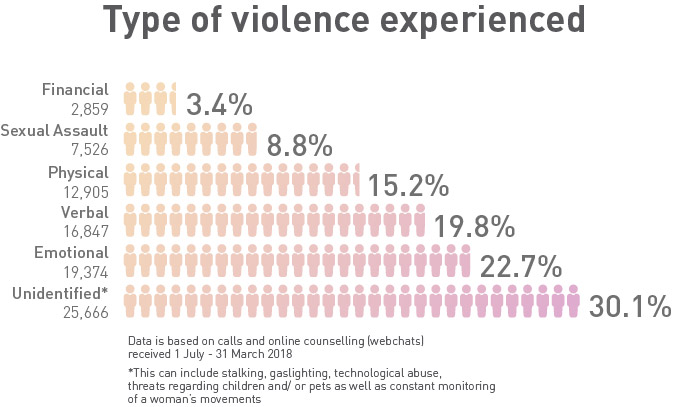-
What would you do if you suspected someone you knew was experiencing domestic violence? It can be hard to know how to respond and you may be worried about doing the wrong thing. There are some simple things you can do that can make a big difference.
Domestic and family violence can take many forms beyond physical abuse – it can also be emotional, verbal, sexual, financial, social, legal, reproductive, and can also include behaviours such as stalking and neglect.
According to 1800RESPECT, the most commonly reported behaviours are emotional abuse and verbal abuse.
How to support someone experiencing domestic violence


-
Familiarising yourself with some possible signs of abuse may help you ascertain when to offer your support.
Signs of violence to be aware of
It can help to be aware that someone experiencing domestic or family violence may:
- Suddenly stop going out with no reason
- Worry a lot about making a particular person angry
- Make a lot of excuses for someone's negative behaviour
- Have marks or injuries on their body that can’t be explained
- Stop spending time with friends and family
- Seem scared or wary around a particular person
- Seem worried that they are being watched, followed or controlled in some way
How to offer support
In an emergency or if is someone is in immediate danger, you should call 000.
If it is not an emergency, a good first step to offering someone some support is to reach out to them and listen.
Choose an appropriate time to ask them an open question, such as: “I'm wondering if everything is OK at home?” You might talk to them about the things you’ve noticed that have given you cause for concern.
Give them the opportunity to open up at their own pace. Avoid pressuring them to reveal anything they are not ready to do, and be wary that adding your opinion can come off as being judgemental.
If they are not ready to elaborate, you may just want to reinforce that you are there if they need you.
To keep the conversation supportive, 1800RESPECT suggests the following:
- Believe them and take their fears seriously. This is important no matter what you think of the person or people who hurt them.
- Listen without interrupting or judging
- Never blame the person experiencing the violence for what has happened to them. Violence is never OK.
- Don’t make excuses for the person who has hurt them
- Understand that they may not be ready or it may not be safe to leave. Don’t try to force them to do what you think is best.
- Remember that domestic and family violence is not just physical
- Help in practical ways—with transport, appointments, child minding, or a place to escape to
- Help explore options. You or the person you are supporting can call 1800RESPECT or visit our website for more information and support.
How 1800RESPECT can help
1800RESPECT is a national service that provides confidential information, referral, counselling and support for all Australians impacted by sexual assault, domestic or family violence.
People can access the free service 24 hours a day, every day of the year via phoning 1800RESPECT on 1800 737 732 or via the website 1800RESPECT.org.au to chat online and to access information and to locate local services.
1800RESPECT also hosts the Daisy app which provides localised information on support services.
Medibank delivers the 1800RESPECT service on behalf of the Australian Government as part of the National Plan to Reduce Violence against Women and their Children. It is delivered through a public private partnership arrangement with three women’s services organisations – safesteps Family Violence Response Centre in Victoria, Women’s Safety Service South Australia and DV Connect in Queensland.
If you or someone you know is impacted by sexual assault or domestic violence, call 1800RESPECT on 1800 737 732 or visit 1800RESPECT.org.au.
In an emergency, call 000.
How Medibank can help
If you’ve experienced domestic or family violence and are concerned about your Medibank policy or personal information, we're here to help.
Learn what options are available for your cover and what changes you can make to your policy and account to keep your details safe on our dedicated Domestic Violence Support page.
Subscribe to receive the best from Live Better every week. Healthy recipes, exercise tips and activities, offers and promotions – everything to help you eat, move and feel better.
By clicking sign up I understand and agree to Medibank's privacy policy






